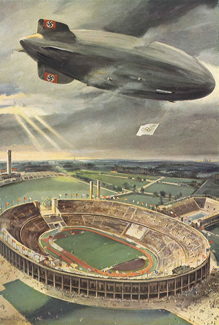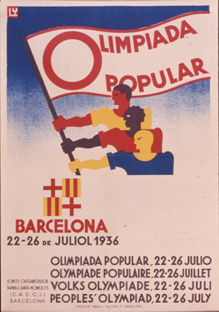
The Hindenburg zeppelin flying over Berlin and the Olympic Stadium, on the opening day of the Olympic Games. Germany, August 1st 1936. Coll. Mémorial de la Shoah/ CDJC.

Advertisement for the Barcelona People’s Olympiad. Spain, 1936. Poster, [35.1 x 24.3 cm]. Coll. Musée national du Sport, Paris.
Book our events online
The Berlin Games
boycott campaign and counter-Olympics
The Berlin Olympic Games were incontestably the media event of the 1930s, not to mention the greatest demonstration of Nazi power.
The Nazi ministry of propaganda stepped up a gear. They covered the globe with postcards, badges, information bulletins in 14 European languages, not to mention the 200,000 posters translated into 19 languages (1,000 of which were in Japanese) and the 4 million brochures distributed by the German Railway Company. Sporting tourism flourished, with 75,000 visitors (including 15,000 Americans) and hundreds of thousands of Germans adding up to a total of 3 million tickets sold. Under Hitler's orders, major construction projects were commissioned to demonstrate Germany's technological and industrial might: a 100,000-seat stadium, with outdoor equipment to seat a further 250,000 spectators, a giant tower complete with a bronze Olympic bell, two new underground stations, a “triumphal avenue” for the Führer's motor convoy, and an ultra-modern Olympic village to house the 4,400 sportsmen and 360 sportswomen who had been selected. The press stand, built to hold 1,100 people, proved insufficient for the 2,800 journalists that attended. For the first time, a direct radio link was offered to 105 overseas stations, reaching 300 million listeners around the world. One final innovation was introduced by Carl Diem: carrying a burning torch from the Temple of Zeus in Olympia to the Berlin stadium, where the Olympic flame would be lit.
The Olympics Games Boycott Campaign
“It is possible that the 1936 Olympic Games will be cancelled, due to the German campaign against the Jews.” the New York Times, April 18th 1933. When the racial Nuremberg laws were adopted in 1935, it spurred the US boycott campaign back into action. This fight for liberty brought together all those who believed in fair play. Among European sports organizations, opposition to the Berlin Games was more sparse. Only the two Socialist Workers' Sport Internationals were able to join forces with the International League Against Anti-Semitism (LICA) and the World Youth Committee. The boycott movement reached a peak in Paris, when the French communists organized an “International Conference for Respecting Olympic Ideals” (6th and 7th June, 1936). It fails on June 19 when Leon Blum and Leo Lagrange authorize and financially support the coming of French athletes in Berlin. In the same movement, they encourage athletes to participate to the Olympiad popular in Barcelona.
The Barcelona Workers Olympiad
After the Great War, the European Left denounced the Olympic Games as “a bourgeois, chauvinist, nationalistic Olympiad”. When the Bolsheviks seized power in Russia and the USSR was born, « Red Sports » began to splinter. In 1924 the Lucerne Socialist Workers' Sport International (SASI) decided to exclude the Red Sport International (RSI), founded three years earlier in Moscow. The SASI organized the « Workers » Olympiad for the promotion of peace” (Frankfurt 1925, Prague 1927, Vienna 1931), while the RSI promoted its « Spartakiads » (Moscow 1928, Berlin 1932). The strategy of a United Front Against Fascism led to unified Red sporting rallies at Paris' Pershing Stadium in 1934, and in Antwerp in 1937.
The organizers of people's sports in Catalonia wanted to bring bourgeois sportsmen together with working-class sportsmen in Barcelona, while the Olympic Games were taking place in Berlin. Their “People's Olympiad, and week of sport and folklore” promoted sport that was healthy, non-mercenary, pacifist and antifascist, anti-colonialist and open to expressions of culture. A number of the 23 national delegations invited didn't correspond to constitutional states: among others, Algeria, Spanish Morocco, French Morocco, Catalonia, The Basque Country, Alsace-Lorraine, Palestine, and emigrant Jews. As a result, the 70 members of the Yiddische Arbeit Sport Klub (YASK) in Paris made the trip to Catalonia with the FSGT delegation. In the end, the People's Olympiad had to be cancelled due to the outbreak of civil war. Next >>
